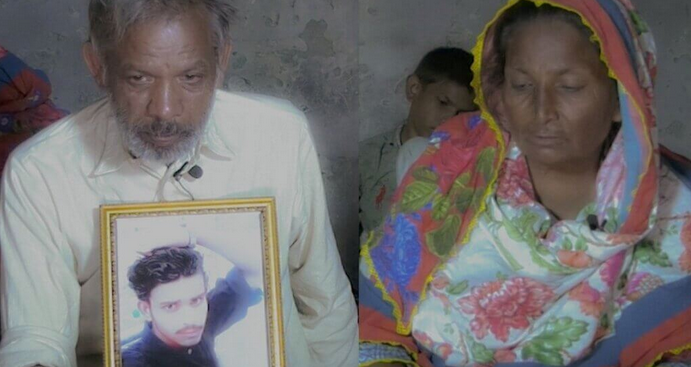In a devastating and heart-wrenching incident, 18-year-old Waqas Masih, a young Christian man, was brutally murdered by the Muslim owners of the factory where he worked. This tragic event has sparked widespread outrage and demands for justice within the community.
Salamat Masih, the 55-year-old grieving father of Waqas, recounted in his First Information Report (FIR) that both of his sons were employed at a plastic bottle factory owned by Haji Saleem. On June 6th, around 3 PM, Salamat Masih received the shattering news from his younger son that factory owner Haji Saleem, his son Omer Saleem, along with workers Shahzad, Bilal, and Shani, had forcibly taken Waqas into the factory and subjected him to a vicious beating, leaving him unconscious.
Overcome with fear and desperation, Salamat Masih, accompanied by his 12-year-old son Awais and others, rushed to the factory. To his horror, he discovered Waqas tied up and being mercilessly beaten with plastic pipes by the factory owner and his associates. Despite Salamat Masih’s desperate pleas for mercy, the factory owner callously insisted that Waqas was merely unconscious. By 3 PM, the unthinkable happened—Waqas was declared dead.
In a state of profound grief and disbelief, the family took Waqas’s lifeless body to Mayo Hospital, Lahore, for an autopsy and later laid him to rest on June 7th. Salamat Masih and his wife Rubina, living in dire conditions, are utterly devastated by the loss of their beloved son. They fervently maintain that Waqas was falsely accused of theft by the factory owner, adding a cruel layer of injustice to their unbearable pain.
Awais, the 12-year-old brother of Waqas, recounted the harrowing experience with tear-filled eyes and a trembling voice. He described how the factory owner and workers mercilessly beat Waqas from 10 AM, subjecting him to electric shocks and breaking many of his bones. Despite Waqas’s desperate pleas to bring his mother, his cries were heartlessly ignored. The torment continued relentlessly until Waqas succumbed to his injuries around 3 PM.
The Masih family, struggling to survive with five children, is now shattered. Three of their children are married and live separately, while Waqas, Awais, and their parents live together in heart-wrenching poverty. Waqas was not just a son and a brother; he was a vital source of income and hope for the family. With his tragic and untimely death, the family’s already fragile existence has been further plunged into despair.
An FIR was registered at Islam Purra police station on June 6th under sections 302 and 34 TP. Yet, as of June 10th, no arrests had been made, and the autopsy report remained withheld from the grieving family, adding a cruel layer of injustice to their suffering.
Nasir Saeed, Director of CLAAS-UK, voiced profound concern over the rising tide of violence and discrimination against Christians in Pakistan. He lamented the continuous false accusations of blasphemy against Christians, including recent horrifying cases involving two women. Saeed criticized the Pakistani government for its failure to protect its Christian citizens, leaving them vulnerable to brutal violence and systemic injustice. The agony of Waqas’s family is a tragic testament to this ongoing neglect and prejudice.
Saeed stated, with a voice heavy with sorrow, “It is a very tenuous and grieving situation for Christians throughout Pakistan. False cases of blasphemy continue to be registered against Christians, and they are living under constant threat. The government must ensure impartial investigations and bring those responsible for these heinous acts to justice.”
His plea grew more urgent as he continued, “The Pakistani government must take immediate action to stop these atrocities and ensure the safety and security of Christians in Pakistan. This includes investigating high-level officials and holding them accountable for their complicity in these crimes.” With a heavy heart, Saeed also requested prayers for the end of the ongoing persecution of Christians and for their safety in Pakistan.
In these poignant words, Saeed captured the deep anguish and relentless fear that Christians in Pakistan endure daily. The call for justice and protection is not just a plea but a desperate cry for humanity and compassion in the face of overwhelming suffering and injustice.
